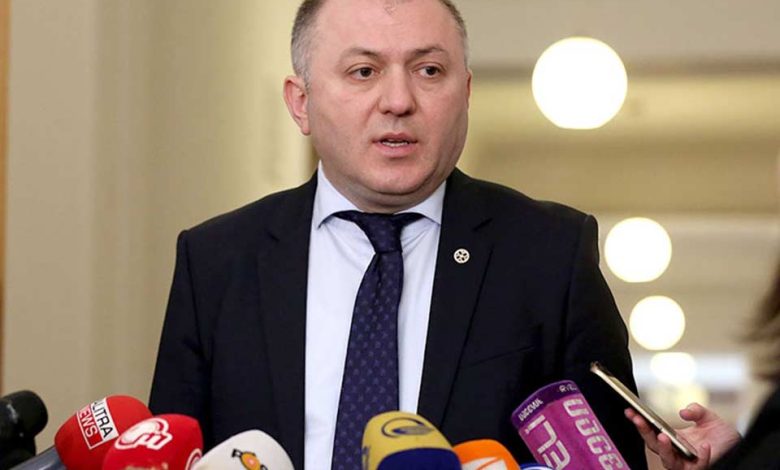
SSSG Annual Report Hearing in Parliament
On October 19, the Parliament of Georgia heard an annual report on the work of the State Security Service of Georgia (SSSG). The report was presented by the head of the agency, Grigol Liluashvili who spoke of the security developments and challenges faced by Georgia and the neighborhood in 2022.
According to Liluashvili, the external security challenges include Russia’s ongoing war in Ukraine and continuing military conflict between Armenia and Azerbaijan that “made 2022 a particularly demanding year in terms of security and stability,” – Laliashvili said.
He pointed out that the war initiated by the Russian Federation in Ukraine had posed significant additional challenges to Georgia’s security, territorial integrity, and socio-political stability, with repercussions for the country’s economy.
Regarding internal security challenges, Liluashvili pointed to “terrorist attacks, uncontrolled and harmful activities of special services of foreign countries, disturbances and destabilisation inspired by external or internal forces”, adding that all departments of the SSSG clearly fulfilled their duties, and as a result, “peace and stability have been maintained in the country.”
The head of the SSSG noted that in 2022, neutralizing threats stemming from the occupation and dealing with the above mentioned challenges have been the main direction of the service’s activity, outlining the measures and actions taken by the State Security Service in response to the threats and challenges facing the country.
Liluashvili emphasized the “active cooperation” between the State Security Service and the Parliament of Georgia, including the relevant committees and the trust group, as part of parliamentary oversight.
After the hearing, the head of the SSSG answered journalists’ questions on US-sanctioned Otar Partskhaladze’s case, so-called “training plot” allegations, and pointed out to the threat of nuclear attack on the region.
Otar Partskhaladze
Regarding the US-sanctioned former Prosecutor General of Georgia Otar Partskhaladze, the SSSG head said that Partskhaladze “was questioned, and not interrogated” and that Partskhaladze left Georgia the following day after the questioning. Liluashvili declined to reveal for which country Partskhaladze left, citing privacy issues and not excluding that it could be Russia.
The SSSG chief also noted that the US side has not provided any evidence of Partskhaladze’s possible links to Russian intelligence agencies.
“Training Plot” Allegations
Asked about the investigation into the so-called “training conspiracy” scenario, Liluashvili said that the people who took part in the training or were involved in it are being summoned to the investigation. According to him, most of them say that they “don’t remember” or “don’t understand”, which makes their attitude in front of the TV cameras even more suspicious. He also pointed out that it does not matter what field these people work in, be it art, writing or poetry, and that revolutionaries are not bound to their professions.
Speaking about the USAID connection to the trainings, Laliashvili said his service only “repeated what they [questioned individuals] stated and said in the testimony”. He also stressed that USAID “had proudly confirmed” that it was sponsoring the training.” SSSG chief said however, that there was “no adversarial approach, as the media tries to portray” and no conflict with the American government. He also said that another issue was “how well they [USAID] knew what the purpose of the training was” saying “he was hopeful” that the “stated purpose of the training was different”, while in reality people were being taught by experience how to organize revolutions.”
Nuclear Attack Threat
SSSG chief made an unexpected statement, saying he does not rule out the threat of a nuclear attack: “Current challenges do not rule out the use of nuclear weapons in the region – shelters will not save us, so we must be smart.” To avoid such catastrophe, “we must be smart, conduct a moderate, pragmatic policy, both inside and outside the country.”. According to him, a special action plan has been elaborated to that end by the government.
Arras Terrorist’s Father
SSSG chief said that the father of Arras terrorist is not present in Georgia. “This information is also false. We are in daily contact with out French colleagues about any information, not only about the parents of the perpetrator, but also about smaller trends and analyses,” – Liluashvili said.
However, Liluashvili also said that the terrorist’s father did not violate the Georgian law, which does not rule out the possibility that he was once in Georgia. “Whether he was here or not, entered of left, 8 million people are arriving in Georgia, although these people, including the murderer’s father, have not violated the Georgian law,” – Liluashvili said.
A few days earlier, media reports surfaced, suggesting that the father of 20-year old Mohammed Mogouchkov, who attacked and killed a teacher in Arras (France) on October 13, lives in Georgia “where he has not yet been questioned.”
Georgia’s Main Enemy – ” Pro-destabilization forces in the country”
When asked as a follow-up question, on October 20, about whether Russia is the main enemy for Georgia, the SSSG head said “not only.” Liluashvili said “pro-destabilization forces in the country are the main enemy.” As for Russia, he added: “Russia is an occupier and I talked about it for five hours, the report is also public and you can find there that Russia is an occupier.”
Also Read:
- 20/10/2023 – US Side Provided no Evidence on Partskhaladze, Says Head of SSSG
- 17/10/2023 – SSSG Summons the Documentary Association of Georgia Member in Connection with “Trainings Plot” Allegations
This post is also available in: ქართული Русский